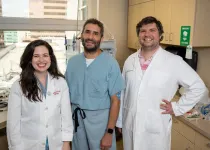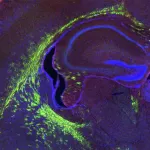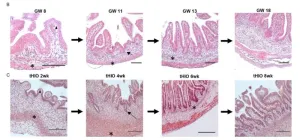(Press-News.org) The Texas Heart Institute and The University of Texas at Austin received a four-year, $2.37 million grant from the National Heart, Lung, and Blood Institute to develop a novel method of managing ventricular arrhythmias, which cause sudden cardiac death. The research initiative is the brainchild of Dr. Elizabeth Cosgriff-Hernandez, Professor of the Department of Biomedical Engineering, Cockrell School of Engineering at The University of Texas at Austin, an expert in biomaterial scaffold engineering for tissue repair and regeneration and electrophysiology medical device pioneer and clinician Dr. Mehdi Razavi, Director of Electrophysiology Clinical Research & Innovations at The Institute. The grant will fund the development of conductive, injectable hydrogel electrodes to prevent and manage ventricular arrhythmias.
Ventricular arrhythmias are potentially life-threatening heart rhythm disorders that originate in the lower chambers of the heart. The underlying electrophysiological imbalance responsible for the development of ventricular arrhythmias is delayed conduction in scarred or diseased heart tissue, according to Dr. Razavi. This type of scarring can be caused by a heart attack (or myocardial infarction), for example.
“We identified an unmet need to deliver electrical signals across these problematic scars in the heart, and unfortunately the leads that are currently available can only be threaded through larger vessels. We envisioned using hydrogels injected into the small vessels that cross over scarred regions of the heart to propagate electrical currents and more effectively pace the heart,” stated Dr. Razavi.
The interdisciplinary research team—comprising electrophysiology researchers led by Dr. Razavi and their close collaborators in Dr. Cosgriff-Hernandez’s biomaterial innovations group—has already demonstrated the feasibility of pacing the heart using the hydrogel in a porcine model.
Building upon the initial proof-of-concept of pacing myocardium (heart muscle) with a hydrogel that cures inside the body, the team will now develop a combined material and delivery system that can interface with existing pacemaker technology to expand its capability in treating ventricular arrhythmias.
The two research teams will work closely to assess the injectable hydrogel's safety, function, and durability in benchtop testing and in a porcine model and develop a transcutaneous catheter delivery system for the novel hydrogel.
Using a myocardial infarction porcine model, the team will evaluate the use of hydrogel to restore conduction across scars to reduce ventricular arrhythmias and implantable cardioverter defibrillator shocks. Such confirmation of increased activation compared to standard-of-care single-point pacing could validate the efficacy of this innovative approach to eliminate the conduction delay in scarred myocardium, which leads to lethal ventricular arrhythmias.
“Stimulating vast areas of the heart through planar wavefront propagation could introduce an entirely new cardiac resynchronization therapy, and ultimately alter the landscape of cardiac rhythm management through a new platform for painless ventricular defibrillation,” added Dr. Razavi.
The grant will enable the team to conduct studies in a post-myocardial infarction model to demonstrate that hydrogel electrode pacing reduces the frequency of ventricular arrhythmias and defibrillation shocks.
“Our clinician-engineer partnership provided critical insights from both medicine and material science to guide how we designed and tested the injectable hydrogel electrode. It is this integrated approach to medical device innovation that enabled the development of a unique technology that can transform how we treat ventricular arrhythmias and improve patient outcomes,” said Dr. Cosgriff-Hernandez.
The research described above is supported by the National Heart, Lung, and Blood Institute of the National Institutes of Health under Award Number R01HL162741. The content is solely the responsibility of the authors and does not necessarily represent the official views of the National Institutes of Health.
###
About The Texas Heart Institute
The Texas Heart Institute is an independent, nonprofit organization that is improving cardiovascular health through trailblazing research, thought leadership, education, and patient care. Located within the Texas Medical Center in Houston, Texas, and founded in 1962 by renowned cardiac surgeon Dr. Denton Cooley, The Texas Heart Institute performed the first successful heart transplant and total artificial heart implant in the United States. Since then, our physicians and surgeons remain recognized as worldwide leaders in the diagnosis and treatment of even the most complex cardiovascular conditions. Research programs at The Texas Heart Institute continue to push the boundaries of cardiovascular science by translating laboratory discovery to patient care. The Texas Heart Institute has been ranked among the top cardiovascular centers in the United States by U.S. News & World Report for more than 30 years. www.texasheart.org @texasheartinstitute
About The University of Texas at Austin
The University of Texas at Austin, founded in 1883, ranks among the 40 best universities in the world, and top 10 among U.S. public universities. UT Austin is a bold, ambitious leader supporting some 52,000 diverse students, 3,000 teaching faculty, and top national programs across 18 colleges and schools. As Texas’ leading research university, UT attracts more than $650 million annually for discovery. Amid the backdrop of Austin, Texas, a city recognized for its creative and entrepreneurial spirit, the university provides a place to explore countless opportunities for tomorrow’s artists, scientists, athletes, doctors, entrepreneurs and engineers. www.utexas.edu
END
The Texas Heart Institute and The University of Texas at Austin awarded a National Institutes of Health grant to develop injectable hydrogel electrodes to prevent ventricular arrhythmias
NIH NHLBI grant to fund the development of conductive, injectable hydrogel electrodes to prevent and manage ventricular arrhythmias
2023-05-05
ELSE PRESS RELEASES FROM THIS DATE:
Majority of NHS Trusts do not offer training to prevent sexual harassment, study finds
2023-05-05
Failure to implement active bystander training could thwart NHS attempts to tackle sexual harassment, say researchers at the University of Cambridge.
An analysis of data from Freedom of Information (FOI) requests found that fewer than one in five NHS Trusts in England provided active bystander training to address workplace harassment, sexual harassment and other forms of unacceptable behaviour like bullying and racism.
It found of those that did – the majority of which were in London – most did not deliver content specific to sexual misconduct and ...
Only one NHS Trust offers standalone training on sexual harassment intervention, study shows
2023-05-05
Only one NHS Trust offers its staff training focused on how to intervene when they witness sexual harassment at work, according to new research published in JRSM Open.
Dr Sarah Steele of the University of Cambridge and Jesus College, Cambridge, and Dr Ava Robertson, received responses from 199 NHS Trusts to their Freedom of Information request. Of those, 35 Trusts offer their staff Active Bystander Training (ABT) but only one of these has a specific module on sexual harassment. While welcomed by the researchers, they note that even that one module is optional for staff and outsourced to a private provider. No staff have yet completed the module.
Of the 163 Trusts ...
Mobile phone calls linked with increased risk of high blood pressure
2023-05-05
Sophia Antipolis, 5 May 2023: Talking on a mobile for 30 minutes or more per week is linked with a 12% increased risk of high blood pressure compared with less than 30 minutes, according to research published today in European Heart Journal – Digital Health, a journal of the European Society of Cardiology (ESC).1
“It’s the number of minutes people spend talking on a mobile that matter for heart health, with more minutes meaning greater risk,” said study author Professor Xianhui Qin of Southern Medical University, Guangzhou, China. “Years of use or employing a hands-free set-up had ...
AI training: A backward cat pic is still a cat pic
2023-05-05
Genes make up only a small fraction of the human genome. Between them are wide sequences of DNA that direct cells when, where, and how much each gene should be used. These biological instruction manuals are known as regulatory motifs. If that sounds complex, well, it is.
The instructions for gene regulation are written in a complicated code, and scientists have turned to artificial intelligence to crack it. To learn the rules of DNA regulation, they’re using deep neural networks (DNNs), which excel at finding patterns in large datasets. DNNs are at the core of popular ...
Archaeologists map hidden NT landscape where first Australians lived more than 60,000 years ago
2023-05-05
Scientists at Flinders University have used sub-surface imaging and aerial surveys to see through floodplains in the Red Lily Lagoon area of West Arnhem Land in Northern Australia.
These ground-breaking methods showed how this important landscape in the Northern Territory was altered as sea levels rose about 8,000 years ago.
Their discovery shows that the ocean had reached this, now inland region, which has important implications for understanding the archaeological record of Madjedbebe—the oldest archaeological site in Australia.
The findings also provide a new way to understand ...
A special omega-3 fatty acid lipid will change how we look at the developing and ageing brain, Duke-NUS researchers find
2023-05-05
SINGAPORE, 5 May 2023 – Scientists from Singapore have demonstrated the critical role played by a special transporter protein in regulating the brain cells that ensure nerves are protected by coverings called myelin sheaths. The findings, reported by researchers at Duke-NUS Medical School and the National University of Singapore in the Journal of Clinical Investigation, could help to reduce the damaging impacts of ageing on the brain.
An insulating membrane encasing nerves, myelin sheaths facilitate the quick and effective conduction of electrical signals throughout the body’s nervous system. When the myelin sheath gets damaged, nerves may lose their ability ...
Similar but different: Antarctic and Arctic sea ice and their responses to climate change
2023-05-05
Results were published on March 29 in Ocean-Land-Atmosphere Research. Researchers used data from previous publications aiming to answer the question of why the Arctic sea ice is responding much more quickly and obviously than the Antarctic sea ice, which has stayed relatively stable according to the long-term studies monitoring the Antarctic region’s sea ice patterns.
“The differences in responses are explained in terms of geographic, climatic and
meteorological differences between the two regions. Arctic sea ice is located in the
polar area and encircled by land, while sea ice in the Antarctic ...
Study identifies messages about vaccinating children against COVID-19 that resonate best with vaccine-hesitant parents
2023-05-05
A study from Ann & Robert H. Lurie Children’s Hospital of Chicago found that parents with children who were not yet vaccinated against COVID-19 were most likely to vaccinate their child after reading the following hypothetical scenario:
You hear from other parents you trust that they have vaccinated their children against COVID-19. Some of them say that they weren’t sure at first about whether the vaccine is safe for kids. But they ended up deciding that it was the best way to fight COVID-19, and the vaccination went fine. ...
Organoids validated as tool for studying fetal intestine development
2023-05-04
Developmental biologists have learned a great deal about how the human digestive tract functions through many years of studies involving fish, frogs, and rodents along with detailed explorations of individual human cells. But nothing quite matches the learning that could be achieved from studying actual human organ systems as they form.
Yet for obvious reasons, running experiments on growing human fetuses is both unethical and illegal.
Now a study led by researchers at Cincinnati Children’s, published online April 18, 2023, in the journal Development, reports that lab-grown tissues called organoids accurately mimic key development stages of the human intestine.
“Achieving ...
New free-to-read collection shares research on the Southwest Asian and North African region
2023-05-04
Sage has launched a free-to-read collection of research and other resources that explore the Southwest Asian and North African (SWANA) region. Categories in the collection include:
gender role and oppression
governments, laws, and policies
information and media
mental health, healthcare, and medicine
protests, conflicts, and war
refugees, displaced, and stateless people
Readers can access the Southwest Asia and North Africa microsite free for a limited time. END ...
LAST 30 PRESS RELEASES:
Study finds Earth may have twice as many vertebrate species as previously thought
NYU Langone orthopedic surgeons present latest clinical findings and research at AAOS 2026
New journal highlights how artificial intelligence can help solve global environmental crises
Study identifies three diverging global AI pathways shaping the future of technology and governance
Machine learning advances non targeted detection of environmental pollutants
ACP advises all adults 75 or older get a protein subunit RSV vaccine
New study finds earliest evidence of big land predators hunting plant-eaters
Newer groundwater associated with higher risk of Parkinson’s disease
New study identifies growth hormone receptor as possible target to improve lung cancer treatment
Routine helps children adjust to school, but harsh parenting may undo benefits
IEEE honors Pitt’s Fang Peng with medal in power engineering
SwRI and the NPSS Consortium release new version of NPSS® software with improved functionality
Study identifies molecular cause of taste loss after COVID
Accounting for soil saturation enhances atmospheric river flood warnings
The research that got sick veterans treatment
Study finds that on-demand wage access boosts savings and financial engagement for low-wage workers
Antarctica has lost 10 times the size of Greater Los Angeles in ice over 30 years
Scared of spiders? The real horror story is a world without them
New study moves nanomedicine one step closer to better and safer drug delivery
Illinois team tests the costs, benefits of agrivoltaics across the Midwest
Highly stable self-rectifying memristor arrays: Enabling reliable neuromorphic computing via multi-state regulation
Composite superionic electrolytes for pressure-less solid-state batteries achieved by continuously perpendicularly aligned 2D pathways
Exploring why some people may prefer alcohol over other rewards
How expectations about artificial sweeteners may affect their taste
Ultrasound AI receives FDA De Novo clearance for delivery date AI technology
Amino acid residue-driven nanoparticle targeting of protein cavities beyond size complementarity
New AI algorithm enables scientific monitoring of "blue tears"
Insufficient sleep among US adolescents across behavioral risk groups
Long COVID and recovery among US adults
Trends in poverty and birth outcomes in the US
[Press-News.org] The Texas Heart Institute and The University of Texas at Austin awarded a National Institutes of Health grant to develop injectable hydrogel electrodes to prevent ventricular arrhythmiasNIH NHLBI grant to fund the development of conductive, injectable hydrogel electrodes to prevent and manage ventricular arrhythmias






